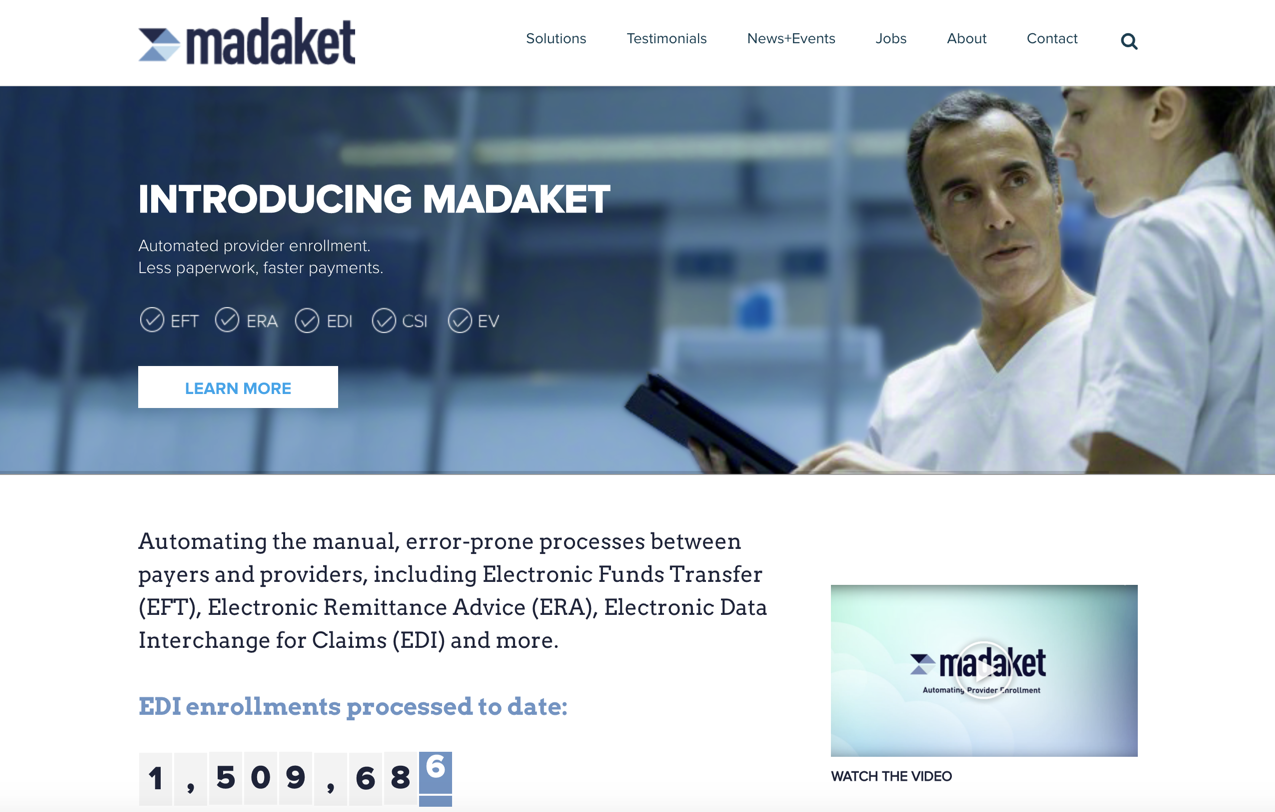



Get new exclusive access to healthcare business reports & breaking news




Madaket Health, a cloud-based, healthcare SaaS platform solution has received $10 million in Series B funding in a round led by Qiming Venture Partners. The new round of funding is backed by a few household name investing groups which include Experian Ventures, The PNC Financial Services Group, and Salesforce Ventures. The company plans to use this funding to clean-up the messy and time consuming payer – health care provider system.
Better data transfer for hospital administrations, better care for patients
Madaket intends to expand its current solution to continue making data exchange between payers and health care providers faster and more reliable.
Ultimately, this will reduce delays in payments that can now take several months to complete. Getting paid in a timely manner encourages healthcare providers to work with certain payers knowing their services will be more promptly reimbursed.
Before we can understand how exactly Madaket intends to manage the administrative inefficiencies in the payer-provider system, let’s first explore the status quo and get a better grasp on why the current ways of doing business need to change.
Payers are organizations with healthcare plans that providers join in order to become part of a health network. This way, providers gain access to more patients who can afford their care.
In short, a health care provider that works with a certain health plan – such as Medicare or Medicaid – is considered “in-network”. In-network providers typically are offered at reduced costs to plan members. This is important because patients typically choose these providers, in order to obtain better care at a price they are able to pay.
In order to become an “in-network” medical care provider, a provider completes two mandatory steps. The first is obtain the proper credentials; the second is to enroll in a program.
Credentialing, as the process is known, basically makes sure all the people working for a certain health provider have the proper qualifications required by their respective professions. These include proof that staff members have the needed training and education and have acquired the necessary skills to safely provide medical assistance to patients. When a facility wants to hire a new employee, it is the healthcare provider’s obligation to contact the “primary source” where the candidate was educated, trained and licensed.
It is not only healthcare providers that use the credentialing process. Insurance companies, prior to allowing a provider access to their network, also use credentialing as a way for providers to get validated in private health care.
Enrollment is another very difficult step for any health care provider who wants to be part of the medical market. Enrollment is the validation of a provider in a public health plan and the approval to bill the agency for services rendered. The process of enrolling in a plan involves requesting to join a health plan, submitting the necessary credentialing, acquiring and sending documentary proofs and confirming the contract.
To apply for credentialing and enrollment can be a very lengthy process – Medicare and Medicaid typically take up to 120 days, while commercial carriers like Aetna and Blue Cross might take up to 90 days.


Now that we understand the complex bureaucratic and tedious space Madaket is trying to positively impact, let’s see how exactly they plan to do so.
We have already established that health care providers need to be enrolled with payers, otherwise, they rarely get paid. But what you may not know is that keeping track of all the payers is very difficult, because the average provider usually has to work with 25 different payers.
Each payer has to receive individual forms from an entity that wants to get paid, containing data and procedures in order to enroll the healthcare provider for Electronic Funds Transfer (EFT), Electronic Remittance Advice (ERA), Electronic Data Interchange for Claims (EDI), etc.
Madaket’s solutions – EDI Enrollment and Payer Enrollment/Credentialing – seek to transform the process of actually moving papers around by creating an automated, mutually shared digital payer-provider transaction. EDI Enrollment will encompass Electronic Funds Transfer (EFT), Electronic Remittance Advice (ERA) and Electronic Data Interchange for Claims (EDI), making all these operations easier for providers to access.
Madaket co-founder and CEO, Jim Dougherty, stated that this not only eliminates massive administrative, time, and money consuming tasks but also gives providers the possibility to better use their time towards taking better care of their patients.
“We brought our proven track record of removing waste, error, and frustration to an industry— healthcare — that spends $130 billion on unnecessary administrative tasks”, Dougherty declared.
Healthcare providers have a single task to perform within this new system: completing a simple online form. After the form is submitted, Madaket ensures the necessary and correct information is sent to each individual payer. This saves each provider from having to complete the same task as many as 25 times, saving countless hours and dollars.
This process, Madaket claims, will result in a considerable reduction in paperwork.
Most importantly, though, it allows a faster transfer of funds to hospitals and other healthcare providers, as well as private practices. The Madaket solution has already proven successful and it is currently being used by Trizetto Provider Solutions, one of the largest healthcare Electronic Data Interchange (EDI) and clearinghouse service providers.
To date, Madaket has processed more than 1.5 million EDI enrollments. These were done on behalf of clients who together reach 1.3 million providers that have already signed contracts to be enrolled on the platform.